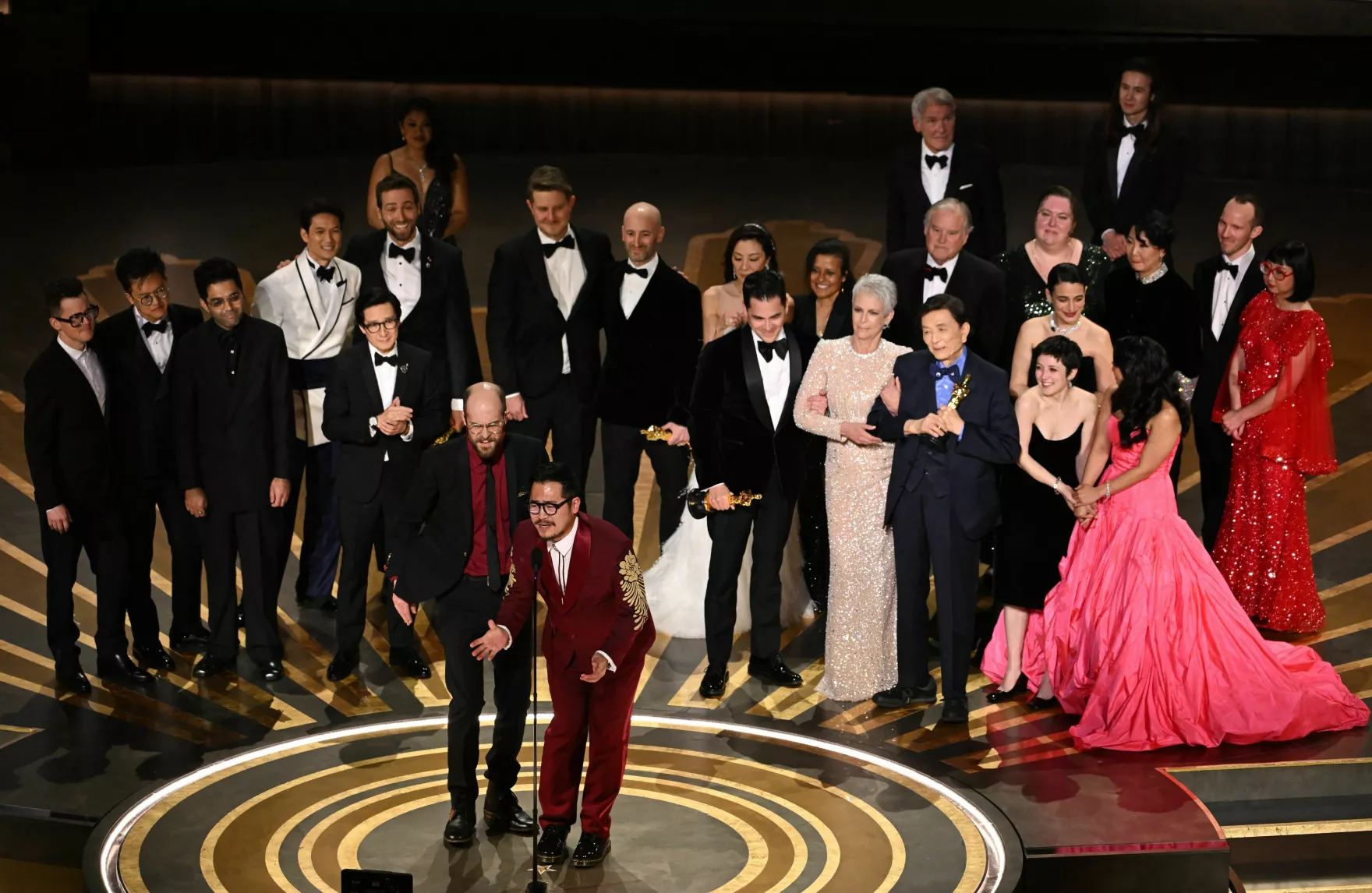By Ben Reed, Arts + Culture Editor
A24’s Everything Everywhere All at Once has single-handedly taken award shows–and the world–by storm this past year, following its release in theaters last March. The film has been noted for its “genre anarchy,” using elements of absurd comedy, science-fiction, fantasy, martial arts films, and animation to tell the story of an aging Asian-American immigrant who struggles to connect with her daughter and husband while pursuing the American dream. Many film analyses of Everything Everywhere note the film for portraying elements of nihilism (or believing that life is meaningless), mental health, generational trauma, and Asian-American identity. At the time of its release, the film was acclaimed for its acting (particularly for its leading ensemble members Michelle Yeoh, Ke Huy Quan, Stephanie Hsu and Jaime Lee Curtis), screenplay, direction, visual effects, and action sequences among many other aspects of the film’s production. The 2023 award season saw Everything Everywhere nominated for major awards for best picture, acting performances, director (Daniel Kwan and Daniel Schienert, known as “the Daniels”), screenplay, costume design, editing and ensemble cast, among other categories. Following its wins at the 95th Academy Awards, including Best Picture, Everything Everywhere has become the most awarded film of all time, surpassing The Lord of the Rings: Return of the King.
Everything Everywhere’s track record in this year’s award season is nothing short of historic. Michelle Yeoh is the second woman of color, and the first Asian-American, to win the Academy Award for Best Actress, following Halle Berry who won for her role in Monster’s Ball in 2001. While people of color have been nominated for Academy Awards since the 1930s, marginalized people being recognized for their work has been underrepresented. Ke Huy Quan, who won several awards for Best Supporting Actor across various circuits, was forced to take a prolonged hiatus from acting, even after his successes in Indiana Jones and The Goonies, due to the absence of opportunities for Asian-American actors. During this time, he did odd jobs to make ends meet. Everything Everywhere served as his comeback to acting, for which he became the first Asian-American to win multiple awards for Best Supporting Actor. “When I started my career as a child actor in Indiana Jones and the Temple of Doom, I felt so very lucky to have been chosen. As I grew older, I started to wonder if that was it. If that was just luck. For so many years, I was afraid that I had nothing more to offer. That no matter what I did, I would never surpass what I did as a kid. Thankfully, more than 30 years later, two guys [the Daniels] thought of me. They remembered that kid, and they gave me the opportunity to try again,” said Quan in his Golden Globe acceptance speech for Best Supporting Actor. Following the success of the film, Quan has landed multiple offers in the film and television industry.
Michelle Yeoh, on the other hand, has had a lengthy career in the film industry, working as both an actress and stunt performer in a variety of martial arts films. While she has been recognized for her previous work in smaller awards circuits, Everything Everywhere served as a catalyst to push Yeoh’s career into the mainstream. Yeoh won 48 awards for her performance in the film across the entire awards season.
Not only did the performances of its Asian-American cast members open more doors for other Asian cast and crew in the film industry, but the praise given for the film’s story also sheds light on a common, yet invisible experience for immigrants all over the United States. The film follows Evelyn Wang (Yeoh), a middle-aged Chinese immigrant who must travel through alternate universes to defeat a great evil that threatens to destroy reality. Evelyn is joined by her husband, Waymond (Quan), with whom she has a strained relationship, and their daughter, Joy (Hsu), whose queer identity Evelyn struggles to understand.. The film explores the various alternative lifestyles that Evelyn could’ve experienced had she taken different routes throughout her life. She chose to leave her family behind in China to pursue a life with Waymond in the United States, only to be left overworked in their family laundromat, rather than being a famous actress, talented opera singer, or even living in a world where people have hot dogs for fingers.
People like Evelyn are often not seen or understood by many in the real world. Intergenerational trauma is explored in her relationship with her father, who disowned her after she chose to move to the U.S. with Waymond. Evelyn’s residual hurt is expressed in her reluctance to connect with Waymond in their relationship and motivation to see the laundromat succeed, as well as her discomfort with Joy’s queerness. As a result of the condescension from her father, Evelyn has prioritized work and success over her relationships with her husband and daughter to prove him wrong. Additionally, Evelyn’s resistance to her daughter’s identity is similar to her own father’s opposition to her choice to move to America. This sense of disownment and subsequent trauma has carried through a generation into Evelyn’s relationship with her daughter, who has begun to exhibit signs of depression and withdrawal from her family. Evelyn’s experience of generational trauma contributes to the broken family that is central to the film’s plot.
Everything Everywhere All at Once’s success as a film serves as a beacon to those who share the lived experience of its characters. It has opened a widespread conversation on the state of representation for Asian-Americans working in the film industry, both on and off screen. This film has been universally acclaimed for its ability to spark formerly unheard conversations about Asian-American identity and generational trauma through a literal out-of-this-world lens. Watching it is both enjoyable and insightful for audiences who seek to see themselves and others in its characters.

